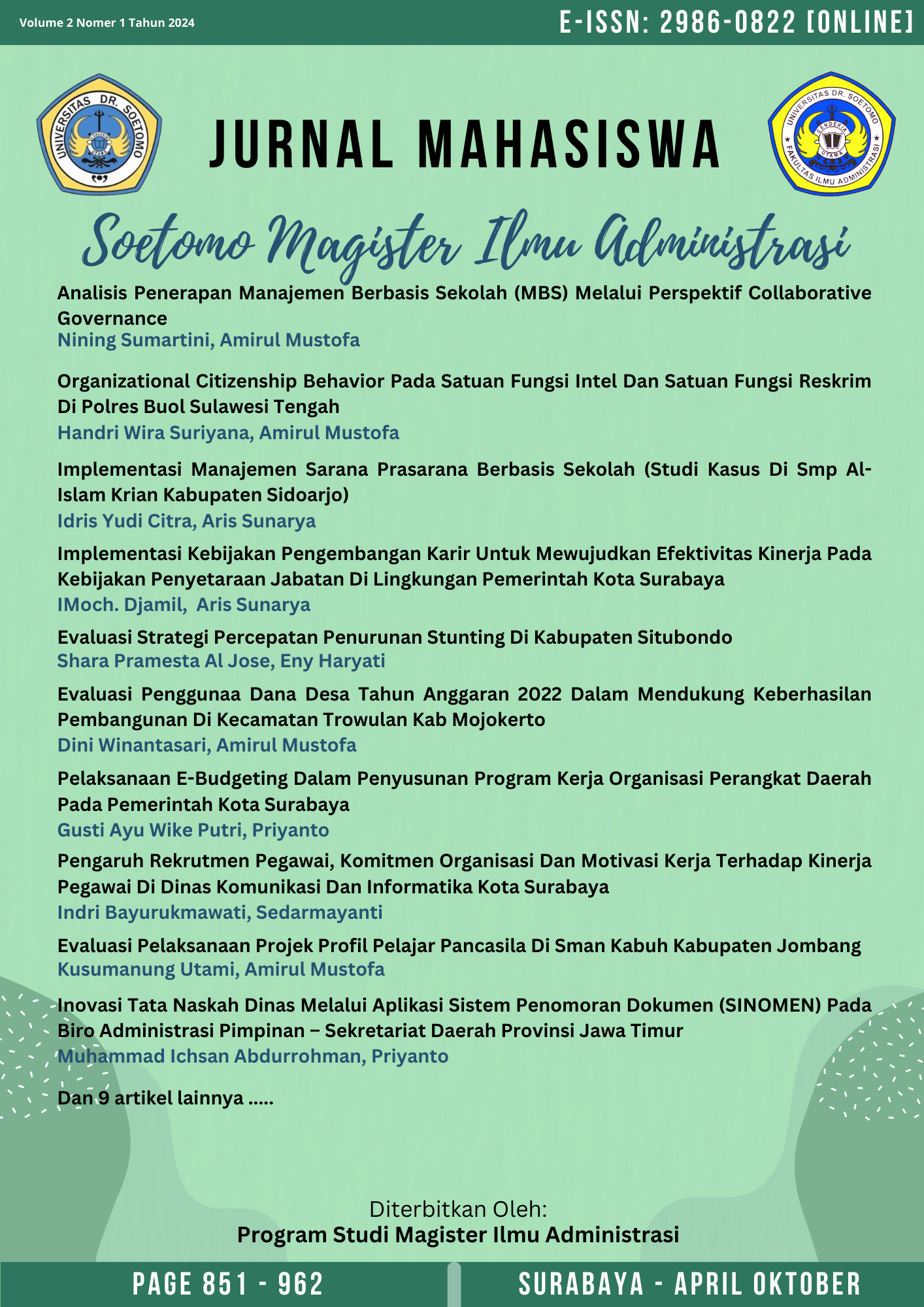Implementasi Praja Sakti (Pelayanan Bersama Jemput Dan Bergerak Dalam Sistem Adminstrasi) Dalam Peningkatan Kualitas Pelayanan Publik Kecamatan Kuta Selatan Kabupaten Badung Bali
 Abstract views: 149
,
Abstract views: 149
,
 Full Text downloads: 129
Full Text downloads: 129
Abstract
In order to enhance the quality of public services at the district level, ongoing innovations are being developed by the district government. Kuta Selatan is one of the areas that has been advancing innovation in public services, known as PRAJA SAKTI. This research aims to explain the impact and challenges experienced in the implementation of the PRAJA SAKTI program for improving public services. Interviews were conducted as the method for data collection, involving the PRAJA SAKTI team as the key informants. The questions posed were developed based on indicators from G.C. Edward III, encompassing communication, resources, decision-making, and bureaucratic structure in public services. The findings from the research indicate that the PRAJA SAKTI program can enhance public trust in the government. The community perceives that the government is committed to providing better and easily accessible public services, leading them to feel more valued and recognized by the government. On the other hand, obstacles encountered in the implementation of the PRAJA SAKTI program include the limited resources of the organizing team. Due to these constraints, PRAJA SAKTI has not been implemented simultaneously. Overall, the PRAJA SAKTI program has a positive impact on the community but faces challenges in its execution.
References
Horn,https//ketyawitaradya.wordpre ss, diakses 5 September 2010, hlm 139.
Agustiono, Leo.2016. Dasar-Dasar Kebijakan Publik, Bandung: Alfabeta.
Abdul Wahab, Solichin. 1990. Pengantar Analisis Kebijaksanaan Negara. Jakarta: Rineka
Cipta
Abdul Wahab, Solichin. 2008. Pengantar Analisis Kebijakan Publik. Malang: Universitas
Muhammadiyah Malang Press
Akib, Header dan Tarigan, Antonius. 2000. Artikulasi Konsep Implementasi Kebijakan:
Perspektif, Model dan Kriteria Pengukurannya. Jurnal
Akib, Hedar dan Antonius Tarigan, “Artikulasi Konsep Impelemntasi
Kebijakan:Persefektif, Model dan Kriteria Pengukurannya,” Jurnal Baca, Volume 1
Agustus 2008, Universitas Pepabari Makasaar, 2008, hlm 117.
Arikunto, Suharsimi. 2006. Prosedur Penelitian Suatu Pendekatan Praktek. Jakarta: PT
Rineka Cipta
Bagong, Suyanto dan Sutinah. 2006. Metode Penelitian Sosial Berbagai Alternatif
Pendekatan. Jakarta: Prenada Media Group
Bungin, Burhan. 2013. Metodologi Penelitian Sosial dan Ekonomi: FormatFormat
Kuantitatif dan Kualitatif untuk Studi Sosiologi, Kebijakan Publik, Komunikasi,
Manajemen, dan Pemasaran. Jakarta: Kencana
Daryanto, SS. 1997. Kamus Besar Bahasa Indonesia Lengkap. Surabaya: Apollo
Dwiyanto, Agus. 2008. Mewujudkan Good Governance Melalui Pelayanan Publik.
Yogyakarta: UGM.Press
Effendi, Sofian. 2005. Membangun Budaya Birokrasi Untuk Good Governance. Hadi,
Sutrisno. 2004. Penelitian Research. Yogyakarta: BPFE
Hardiyansyah. 2011. Kualitas Pelayanan Publik: Konsep,Dimensi, Indikator, dan
Implementasinya. Yogyakarta: Gava Media
Indradi, Sjamsiar Sjamsuddin. 2010. Dasar-Dasar dan Teori Administrasi Publik.
Malang: Agritek YPN
Mulyadi, Deddy. 2015. Studi Kebijakan Publik dan Pelayanan Publik. Bandung:
Alfabeta.
Subarsono, 2015. Analisa Kebijakan Publik (Konsep, Teori dan APLIKASI). Pustaka
Pelajar : Yogyakarta
Syarfi, Wirma, 2012, Studi Administrasi Publik.Jatinangor. Erlangga
Wardianto,Bintaro. 2013. Revitalisasi Admninstrasi Negara: Reformasi Birokrasi
Dan E-governance.Yogyakarta. Graha Ilmu.
Moleong, J. Lexy. 2007. Metode Penelitian Kualitatif. Bandung: Remaja Rosdakarya
https://kutaselatan.badungkab.go.id/
Peraturan Pemerintah Daerah Nomor 11 Tahun 2005 Tentang Pelayanan Publik
Peraturan Pemerintah Republik Indonesia Nomor 38 Tahun 2017 Tentang Inovasi
Daerah
Undang-Undang Republik Indonesia Nomor 25 Tahun 2004 Tentang Sistem
Perencanaan Pembangunan Nasiona








